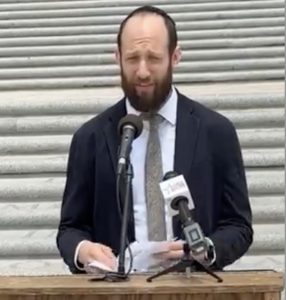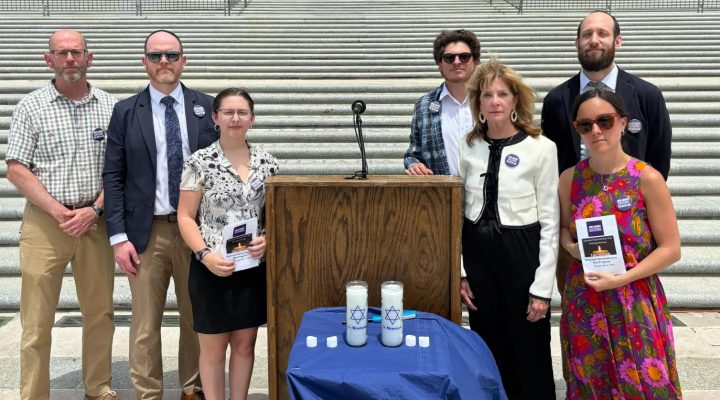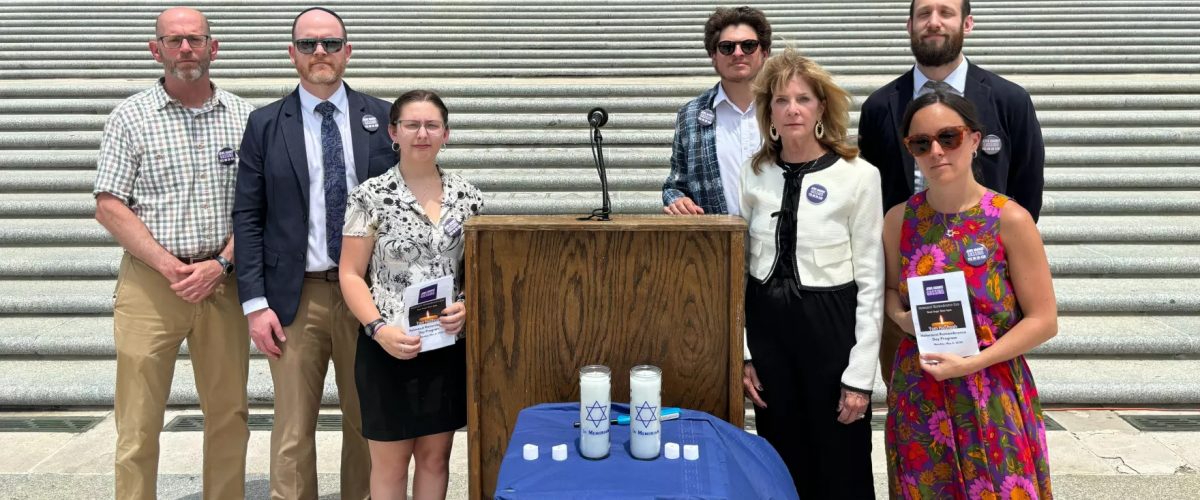Louisiana’s Jewish community has formed an alliance committed to protesting and ultimately repealing a new state law allowing the use of gas as an execution method.
The Jews Against Gassing Coalition was formed after the March 5 passage of House Bill 6, which added the electric chair and nitrogen hypoxia as alternatives to lethal injection for Death Row inmates.
The group gathered May 6 at the state Capitol in Baton Rouge to observe Yom HaShoah, or Holocaust Memorial Day, and to urge legislative support for a pending bill to remove gas as an execution method in Louisiana.

Phil Kaplan
“It is unfortunate that we need to be hosting this event on the Capitol steps today. But it is necessary, on the same day we remember past atrocities, to speak out to prevent the state from utilizing a means of execution that evokes memories of the method that was used to kill so many of our ancestors,” said Rabbi Phil Kaplan of Congregation Beth Israel in New Orleans.
“The use of poison gas for state-sanctioned execution unmistakably and immediately evokes for millions of American Jews horrific memories of the depravities our ancestors suffered at the hands of Nazi Germany, where lethal gas was used to mass murder our people.”
Nitrogen hypoxia made national and international headlines in January when Alabama became the first state known to execute a prisoner using the agent. Death penalty opponents around the world denounced Kenny Smith’s Jan. 25 execution as cruel, inhumane and experimental.
The state’s prediction Smith would quickly pass out after inhaling the nitrogen gas did not turn out to be the case, AL.com reported in a video: “Media witnesses saw that Ken Smith appeared to be conscious for several minutes after the gas began to flow before he proceeded to shake and writhe on that gurney for about 2 minutes. That 2 minutes of shaking and writhing on the gurney was followed by about 5 to 7 minutes of heavy breathing.”
The Equal Justice initiative pounced on the disparity between the state’s promise the gas would induce a quick and painless death and the fact it took Smith from 7:53 p.m. to 8:25 p.m. to die: “Mr. Smith clenched his fists and his legs shook. As Mr. Smith gasped for air, his body lifted against the restraints. Witnesses observed fluid inside of the mask. What witnesses observed last night are clear signs of distress and suffering.”
The United Nations swiftly condemned the execution as barbaric. “The use, for the first time in humans and on an experimental basis, of a method of execution that has been shown to cause suffering in animals is simply outrageous.”
Using Smith “as a human guinea pig to test a new method of execution amounted to unethical human experimentation and was nothing short of State-sanctioned torture,” the U.N. added. “The gruesome death inflicted on Smith is also likely to have caused extreme distress and suffering to his relatives.”
Smith devoted his last words to echo that sentiment and to reflect on the damage done to the state’s moral fabric, according to the federal Defender Services Office: “Tonight, Alabama caused humanity to take a step backward. … I’m leaving with love, peace and light. Thank you for supporting me, love all of you.”
“Tonight, Alabama caused humanity to take a step backward.
Religious groups swung into action in early March when Louisiana legislators, acting in special legislative session convened by Gov. Jeff Landry, voted to emulate Alabama’s use of nitrogen hypoxia. Leaders from a cross-section of faith organizations gathered on the Capitol steps to blast the legislation as “inexcusably cruel.”
And their voices were heard. Baton Rouge Public Radio recently reported the use of nitrogen hypoxia “is getting some pushback late in the legislative session.” Senate Bill 430, which would strike the use of gas from the state’s lineup of execution methods, passed out of committee unanimously in April.
The Jews Against Gassing Coalition ascribed the shift to legislators’ emerging awareness of the connection between gas and genocide.
“We realized after speaking to many legislators in the past few weeks that they didn’t realize how it would feel for us as Jews to add gassing as some method of execution,” said Jacqueline Stern, an executive board member with the Jewish Federation of Greater New Orleans. “They didn’t make the association with the Holocaust, but after it was brought up to them, it was undeniable and they understood our coalition’s perspective.”
Opposition to the use of nitrogen hypoxia for executions is rooted in the historical experience, moral teachings and commitment to justice of the Jewish community, said Aaron Bloch, director of Jewish multicultural and governmental affairs for the Jewish Federation of Greater New Orleans.
“The use of lethal gas in executions evokes painful memories of the Holocaust, where millions of Jews and others were murdered in gas chambers,” he explained. “And while we do not suggest comparisons to the atrocities of Nazi Germany under which millions of our relatives were murdered, still, we cannot imagine that Jewish communities anywhere can stand by while prisoners are executed in our names using any variation of that mechanism.”
Related articles:
Global condemnation falls on Alabama for experimental capital punishment method


